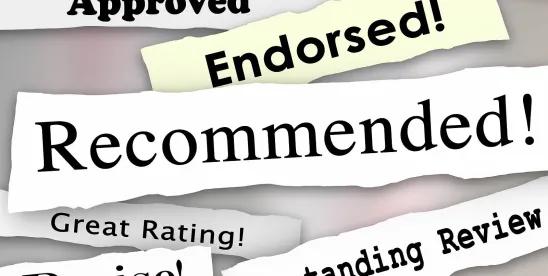On 25 July 2025, the UK Competition and Markets Authority (CMA) announced that it has been actively reviewing websites to ascertain levels of compliance following the 2024 legislative ban on “fake reviews”.
The CMA, both a consumer protection and a competition authority, has taken several actions to protect consumers in recent years, such as deterring “greenwashing”, tackling unfair online sales practices, cracking down on unfair provisions in UK residential property leases, and dealing with fake online reviews.
To give consumers greater confidence in online purchases, the CMA has been tackling fake reviews since May 2020, aiming to deter businesses that try to benefit from fake reviews and sanction those that write fake or misleading reviews.
The CMA gained new consumer enforcement powers to address fake reviews under the Digital Markets, Competition and Consumers Act 2024 (DMCCA). Fake reviews are banned under the DMCCA, together with practices that encourage them. In addition, the CMA has new powers to investigate and act (including by imposes fines) against parties in breach of the law.
What Are the CMA’s Enforcement Powers Under the DMCCA?
Since the DMCCA took effect 1 January 2025, the CMA has been educating and encouraging compliance amongst firms.
The CMA published its guidance regarding fake reviews in April 2025 and allowed a three-month grace period to give firms time to update their systems and processes to ensure compliance. This period concluded earlier this month, when the CMA announced it has been reviewing websites and noted that some firms appeared not to have a policy in place banning fake reviews or explaining their approach to incentivised reviews. Other firms had policies in place, but some were unclear, incomplete, or inaccessible.
To address this, the CMA is writing to those it believes may be noncompliant, advising them to take appropriate steps. Any company that receives a letter is being asked to respond to the CMA explaining what changes, if any, they have made, or are making, to comply with the law.
Who Does the CMA’s Guidance Apply To?
The CMA’s guidance applies to firms who publish consumer reviews or consumer review information, including:
| (a) | about other firms and their products; and |
|
| (b) | reviews or review information originally collated by someone else. |
These firms are responsible for any publication formats they operate, which may include:
| (a) | websites; |
|
| (b) | social media; |
|
| (c) | search services; |
|
| (d) | online marketplaces; |
|
| (e) | specialist review sites; |
|
| (f) | trader recommendation platforms; and |
|
| (g) | print publications. |
Considerations for Firms In Light of the CMA’s Guidance
To comply with the law, firms that publish consumer reviews or consumer review information may wish to consider taking reasonable and proportionate steps to prevent and remove fake reviews, concealed incentivised reviews, and false or misleading consumer review information being published.
Firms may wish to ensure they have procedures for doing this and that they publish a policy that clearly prohibits fake reviews. They should also consider taking steps to:
| (a) | detect banned reviews and false/misleading consumer review information; |
|
| (b) | investigate banned reviews and false/misleading consumer review information; |
|
| (c) | act in response to banned reviews and false/misleading consumer review information. |
Firms should consider conducting a risk assessment as a starting point for assessing and embedding compliance that should:
| (a) | assess the risks that may lead consumers to encounter banned reviews and false/misleading consumer review information; |
|
| (b) | identify appropriate measures to address such risks effectively; |
|
| (c) | consider relevant evidence and information, including, for example: |
| – | dentification procedures; |
|
| – | concerns flagged by users and others; and |
|
| – | findings of investigations or internal evaluations. |
What Factors Should Firms Consider When Developing Policies for Managing Fake Reviews?
Firms should consider implementing policies and procedures that are reasonable and proportionate for their business. Factors to consider include:
| (a) | the incentives and opportunities people have for posting fake content; |
|
| (b) | the source of the consumer reviews or consumer review information that is published, such as whether users can publish directly or if they are first published on a site controlled by someone else; |
|
| (c) | the functionality on the site for sharing or promoting reviews; |
|
| (d) | the type of content shown to consumers; |
|
| (e) | the potential impact of the activity on the traders being reviewed; and |
|
| (f) | any additional risks resulting from the impact or potential impact of banned reviews on aggregated consumer review information. |



 />i
/>i

